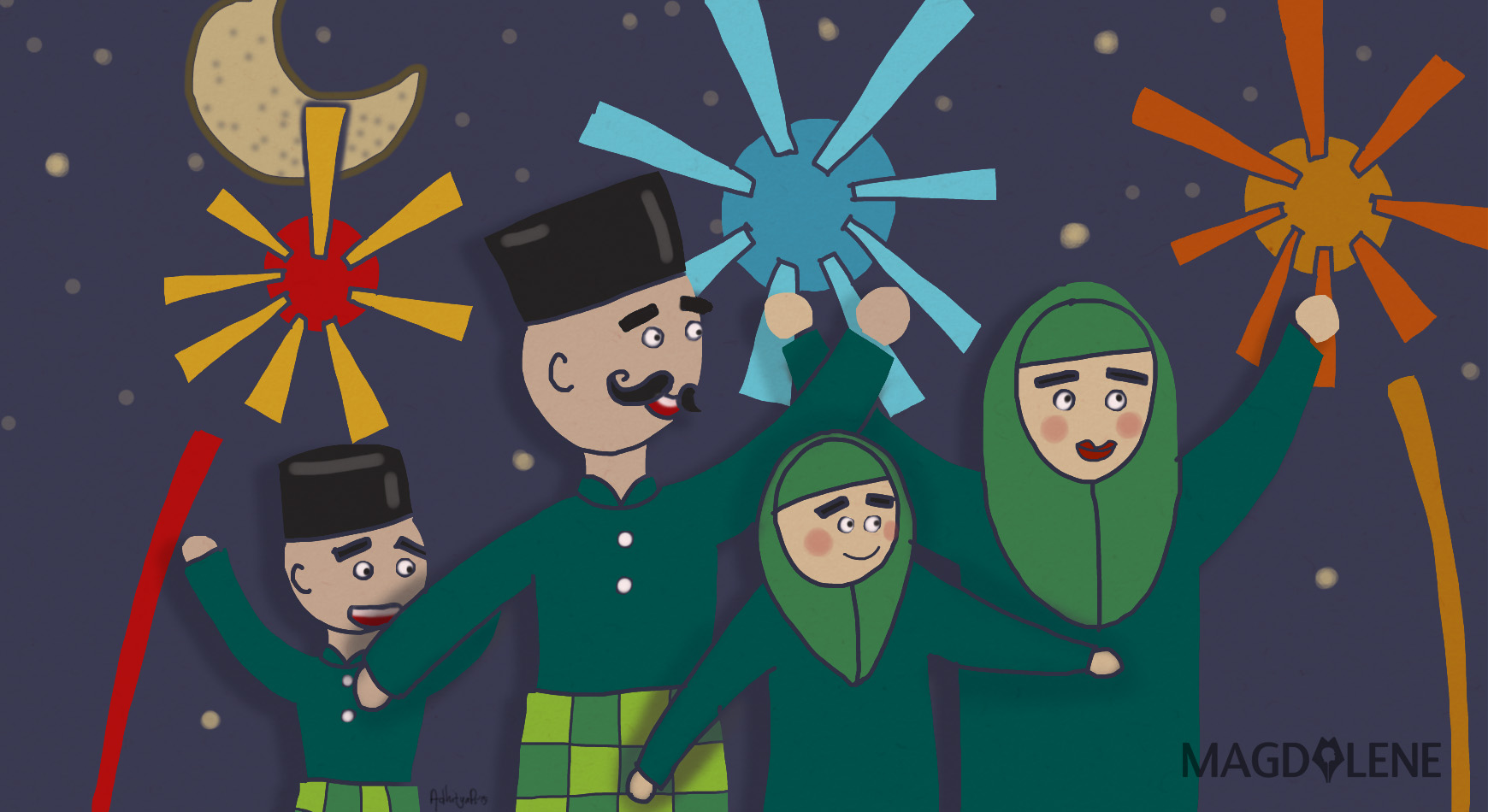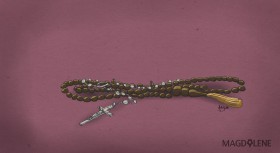My children are the only ones in their class who would not be doing the balik kampung trip (or mudik in Indonesian parlance). As a matter of fact, the kids have spent every single Idul Fitri right here in the gentrified suburbs of Kuala Lumpur, save for the two Syawals that we were in Jakarta, when we spent the auspicious day freeloading at people's houses before returning home to dip our fat bellies in the pool.
It's always the same thing every year. On Idul Fitri morning, we'd do the usual rushed tango: wake up bleary eyed from one long night of cooking, haul the kids out of bed, get them dressed and stuff them into the car so that we'd have enough time to catch morning prayers at the mosque in Kelana Jaya. Then we'd have breakfast with my parents at my mom's house, do the usual salam-salam and bit of photo-taking, then drive to Tanah Perkuburan Jalan Ampang to recite the Yaasin and ziarah the graves of my deceased parents-in-law, before ending up at my sister in-law's house in Setapak.
By the time we get to her house, it'd be almost three or four in the afternoon, and the kids would have wilted, done in by the heat and their stifling festive clothes. My husband would be drenched in sweat and would fall asleep clad only in his Baju Melayu pants. For the past twenty five years, that's Idul Fitri for me: a mad dash across town and the pronounced smell of my husband's armpits.
I'd complain that there's no fun celebrating Idul Fitri in the city, but my husband would shame me and put my grouses in perspective. It's a religious event, he'd say, and the only things that matter are the Idul Fitri prayers and forgiveness from your parents. Your parents live in the city, he'd remind me, so what to do?
To me, these are mere technicalities. I could always transport my parents to any suitable rural location.
My husband, Kuala Lumpur-born and bred, do not have memories of celebrating Idul Fitri in the kampung. When he was small, he had only one surviving grandparent who lived in Malacca town and even then, he hardly knew her. Those pastoral Idul Fitri commercials showing old people rushing out of stilt homes to greet their grandchildren do not resonate with him. His tenuous link to any semblance of Malay heartland is his small clutch of relatives in Jalan Khatib Koyan, which is, like, right there in the shadows of KLCC. He has been deprived of the true-blue Malaysian Hari Raya experience, and has unfairly passed on this dysfunction to my children.
My poor children. If only I could give them the Raya that I had as a child in Terengganu, so that they, too could do the stuff that my killjoy puritan husband might dismiss as bid'aah (heresy).
Celebrations would begin as early as Malam Tujuh Likur (the twenty-seventh night of Ramadhan) when my grandmother's house in Merang would be ablaze with the light of kerosene lamps set atop her fence posts. I remember going round the village with my sisters and our friends with Chinese lanterns in hand on Malam Tujuh Likur, just as one would during Moon Cake Festival. I don't know if this was a real tradition, or just an excuse for us kids to roam at night.
On the eve of Idul Fitri, we'd have one final iftar (evening meal at the end of a fast) at my grandmother's house, with coconut juice and Terengganu delicacies like nekbat (sponge cake in syrup) or ikang golek (grilled fish in coconut milk). After Maghrib (dusk) prayers my father would light firecrackers and sparklers, and the acrid smell of sulfur will mingle with the aroma of my grandmother's nasi minyok hujang panah (literally, summer rain oily rice – oh, just trust me) cooking on the wooden stove in her kitchen. When my grandfather was still alive, he would bring us to town during the day to buy the firecrackers from vendors along the five-foot way outside Kedai Payang, and I would always pick the mercung ayang telor, chicken-shaped squibs that would produce egg-like sparks when fired.
On Idul Fitri morning, we'd be in our new clothes, bright baju kurungs sewn by my mother, and if my grandmother was in a good mood, she'd loan us her jewelry. The table would be laden with nasi minyok (the aforementioned rice), kurma daging (spicy beef stew), ayam masak merah (chicken cooked with tomatoes and chillies) and my grandmother's signature jelly of frothy egg-white, green and pink, which she would have prepared in the dead of night to avoid others from discovering her recipe. There would always be ketupat daun palas (glutinous rice wrapped in palm leaves) and tapai pulut (sweet, almost alcoholic fermented glutinous rice) wrapped in the leaves of the jambu laut tree, and fizzy orange drinks in dainty gold-rimmed glasses.
We would also celebrate Idul Fitri at my maternal grandparents' house in Besut, about 40 minutes away from Merang. The journey itself was a joy, a drive through brush land, across rivers with brackish brown water, and along white beaches edging the brilliant blue sea. My mother has a large family and during Idul Fitri, the ample house in Alor Lintang will be filled with the sounds of grandchildren running across the wooden floors, and younger siblings playfully arguing with each other.
My favorite auntie, Che' Nor would have stayed up all night to complete the blouse she wore that day. My uncles would indulge us by giving away a generous sum of duit Raya (token amount of money usually given to children), which my cousins would stick in their songkoks (cap). Then it would be time to take the Idul Fitri photograph, and we would all line up on the steps of the house and pose as my father snapped pictures for posterity.
At night, the children would light up more fire-crackers, and fall asleep on kapok-filled mattresses laid out on the floor in the front of the house.
I miss visiting relatives with my parents during Idul Fitri, and I fear my ties with them will soon fade because I can't remember them any longer, or I don't know the children of those who have passed away. I love going to the home of my mother's uncle, Tok Su Wan Su, and admire his wood carvings. He'd bring us to his workshop, or he'd show us what he's been working on – an intricately cut wayang kulit (shadow puppet) figurine, the awan larat of a door frame, a sumptuous wooden cabinet. I used to play with his grandchildren during school-holidays and we used to catch fish and hunt for kemunting (wild berries) together, but sadly, I can no longer recall their names or faces.
We call Tok Su's wife Do Mek or "younger mother", and each time we visit them my uncle will always joke that we're seeing a door-mat. Of course, Do Mek was anything but.
On some occasions, we would visit my grandmother's relatives in Kota Bharu and rural Kelantan. One of her uncles lived in a house fringed by rubber trees, and I remember walking up to the place in the dappled sunlight as the fruits popped overhead.
I know less of my father's relatives, save for a garrulous grand-uncle who lives in a house perpetually in construction. He was a repository of memories and even though I kept reminding myself that I should write it all down, I never got round to it. He passed away a couple of years ago, and with him went all those stories that I had promised myself to capture.
And essentially this is the crux of my obsession with balik kampung – the hope that my visits could trap time: revive the yesterdays of my childhood and of those before me.
Alas, my husband doesn’t share my romantic notions of celebration. The wet blanket insists that we spend it here, at a time when even rats abandon the city. Ah, he would say as we drive through deserted streets, it's good to have Kuala Lumpur all to myself again. That's his idea of Idul Fitri: the lack of traffic. The closest we would come to the idyllic Idul Fitri is to watch an Upin & Ipin Raya Special on TV.
Fortunately, there may be a happy solution to my plight. A few years ago, we bought a parcel of land in a small village about an hour away from the city, and we would be building a house there soon. Next year, God willing, I can have the rustic Raya that I have been yearning for: all I need are a couple of bald-headed twins and my late grandmother’s secret jelly recipe.
Former journalist Elida Bustaman is 47 years old (or “old enough to know better”) and lives with her husband and five children in Kuala Lumpur. In between motherhood and sex-goddess duties, she would dream of fantastic plots and story lines, never writing them down. She currently works as a Corporate Communications Manager at an oil and gas company to support a shoe habit.








Comments